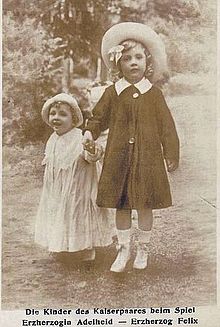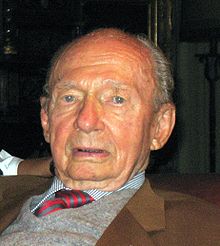Felix Habsburg-Lothringen

Felix Habsburg-Lothringen (born May 31, 1916 in Vienna ; † September 6, 2011 in San Ángel , Mexico City ; born Felix Friedrich August Maria vom Siege Franz Joseph Peter Karl Anton Robert Otto Pius Michael Benedikt Sebastian Ignatius Marcus d'Aviano , Archduke of Austria ) was the fourth child of Emperor Karl I of Austria .
Life
Felix, who was still born at Schönbrunn Palace , spent his childhood in exile in Switzerland, Portugal and on the island of Madeira after his father's abdication in 1918 . After Karl's death in 1922, the family lived in Belgium . Habsburg-Lothringen studied law at the University of Leuven .
In 1937 he came back to Austria, where he attended the Theresian Military Academy . After the “Anschluss” of Austria , he and two siblings fled across the Czechoslovak border.
In 1939, Habsburg-Lothringen and his uncle Felix von Bourbon-Parma were at the World's Fair in New York when the Second World War broke out. He volunteered for the military, but was not used. At the same time, he and his eldest brother Otto began agitation for a “free and independent” Austria. He tried in vain to warn President Roosevelt not to leave Central Europe to Stalin .
In 1952 he married Anna Eugenie Duchess von Arenberg (1925–1997), with whom he had seven children. He worked as a banker and economic advisor in Mexico. Together with his brother Carl Ludwig Habsburg-Lothringen , he had campaigned in vain for the return of the former Habsburg private assets.
Only Carl Ludwig and Felix Habsburg-Lothringen within the family refused to sign the waiver made by Otto von Habsburg in 1961, which is why they were still not allowed to enter Austria. At the funeral of Empress Zita in 1989, the government initially intended to refuse entry to Felix and Carl Ludwig. They were finally allowed to enter, but only for a few hours. Only a later waiver of claims to power by his brother and him after an illegal entry was considered sufficient by the Austrian government on March 26, 1996 and in the main committee of the parliament on April 16, “so that the issuing of passports, which also for entry into Austria is valid, nothing stands in the way. "

In 2011 he died as the last child of the former imperial couple. In the obituary notice he is still referred to as "Archduke of Austria, Prince of Hungary and Duke of Bar". The grave of Felix Habsburg-Lothringen lies in the family crypt of the Habsburgs in the Loreto Chapel of the Muri Monastery in Switzerland.
literature
- Gerhardt Plöchl: Willibald Plöchl and Otto Habsburg in the USA. Wrestling for Austria's “government in exile” 1941/42. Documentation archive of the Austrian resistance, Vienna 2007, ISBN 978-3-901142-52-9 .
Individual evidence
- ^ Gerhard Tötschinger (ed.): Otto von Habsburg: A battle for Austria, 1938–1945. Amalthea, Vienna 2001, ISBN 3-85002-460-1 , p. 47.
- ^ Felix Habsburg: Emperor's son, entrepreneur, patriot. In: DiePresse.com , September 9, 2011, last accessed on September 12, 2011; Gerhard Tötschinger (ed.): Otto von Habsburg: A battle for Austria, 1938–1945. Amalthea, Vienna 2001, ISBN 3-85002-460-1 , p. 110.
- ↑ a b Felix Habsburg-Lothringen is dead
- ↑ Main Committee: Declarations of waiver by the House of Habsburgs sufficient. National Council President Fischer welcomes unanimous decision. In: Parliament correspondence of the Austrian Parliament of April 16, 1996, No. 196; Karl Vocelka , Lynne Heller: The private world of the Habsburgs. Life and everyday life of a family. Styria, Graz 1998, ISBN 3-222-12642-9 , p. 324.
Web links
| personal data | |
|---|---|
| SURNAME | Habsburg-Lothringen, Felix |
| ALTERNATIVE NAMES | Felix Friedrich August Maria of Victory Franz Joseph Peter Karl Anton Robert Otto Pius Michael Benedikt Sebastian Ignatius Marcus d'Aviano, Archduke of Austria (birth name) |
| BRIEF DESCRIPTION | Austrian Archduke, son of Emperor Karl I. |
| DATE OF BIRTH | May 31, 1916 |
| PLACE OF BIRTH | Vienna |
| DATE OF DEATH | September 6, 2011 |
| Place of death | San Ángel , Mexico City |
